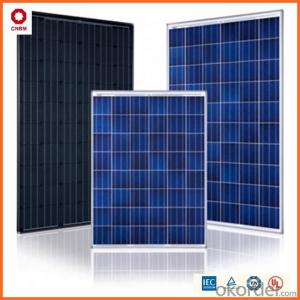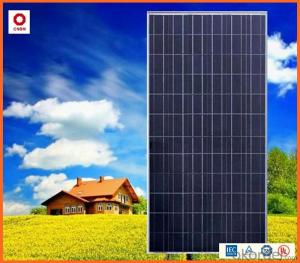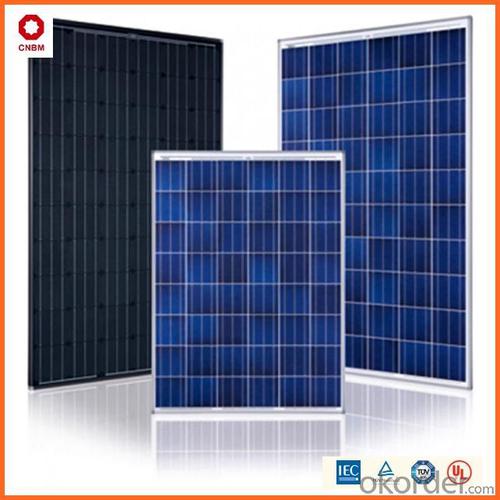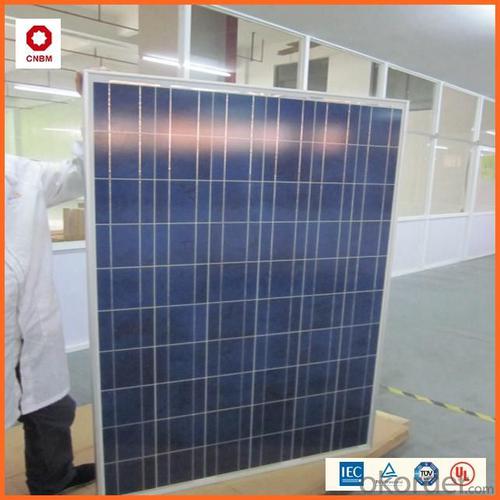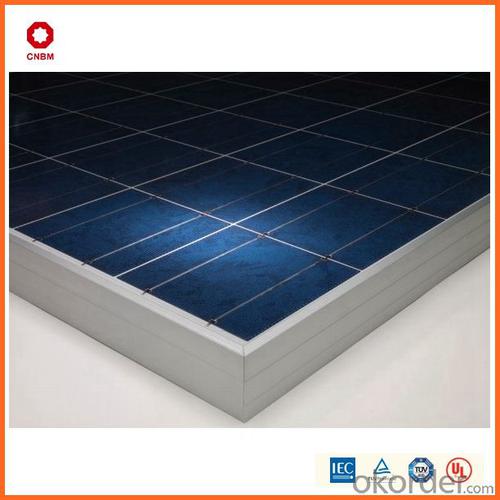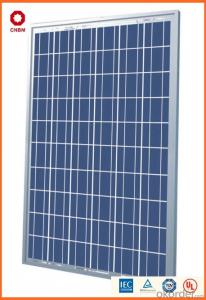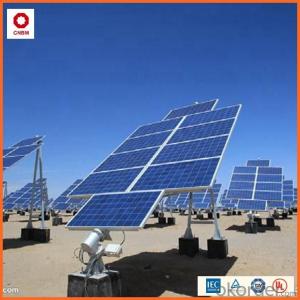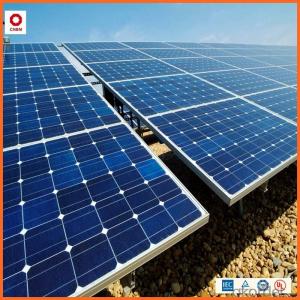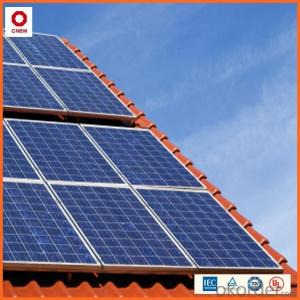Solar Energy Systems Spain ☆☆☆stock on sale 255w poly solar panel 0.45/w!!!!☆☆☆ a grade good quality
- Loading Port:
- China main port
- Payment Terms:
- TT OR LC
- Min Order Qty:
- 1 watt
- Supply Capability:
- 10000000 watt/month
OKorder Service Pledge
OKorder Financial Service
You Might Also Like
Product Description:
Hot Sale !!! Quality and Safety of 245w-320w Poly Solar Panel
1. Rigorous quality control meets the highest international standards.
2. High-transmissivity low-iron tempered glass, strong aluminium frame.
3. Using UV-resistant silicon.
4. IS09001/14001/CE/TUV/UL
Warranties of 245w-320w Poly Solar Panel
1. 10 years limited product warranty
2. 15 years at 90% of the minimal rated power output
3. 25 years at 80% of the minimal rated power output
Technical date of 245w-320w Poly Solar Panel
ITEM NO.: | Mono 125*125 cell ,36pcs . Power range from 80Wp-100Wp | ||||||||
Maximum Power(W) | 80 | 85 | 90 | 95 | 100 | ||||
Optimum Power Voltage(Vmp) | 17.81 | 17.89 | 17.94 | 17.99 | 18.06 | ||||
Optimum Operatige Current(Imp) | 4.78 | 4.91 | 5.12 | 5.35 | 5.59 | ||||
Open Circuit Voltage(Voc) | 21.98 | 22.05 | 22.14 | 22.28 | 22.45 | ||||
Short Circuit Current(Isc) | 4.95 | 5.15 | 5.36 | 5.65 | 5.84 | ||||
Solar Cell: | 125*125 Mono | ||||||||
Number of Cell(pcs) | 4*9 | ||||||||
Brand Name of Solar Cells | JA Cell, Bluesun Cell | ||||||||
Size of Module(mm) | 1580*808*35 | ||||||||
Caple & Connector Type | Pass the TUV Certificate | ||||||||
Frame(Material Corners,etc.) | Aluminium-alloy | ||||||||
Backing (Brand Type) | TPT | ||||||||
Cell Efficiency for 100W(%) | 15.8% | ||||||||
Weight Per Piece(KG) | 12.0KG | ||||||||
FF (%) | 70-76% | ||||||||
Junction Box Type | Pass the TUV Certificate | ||||||||
Tolerance Wattage(e.g.+/-5%) | ±3%, or 0-3% | ||||||||
Front Glass Thikness(mm) | 3.2 | ||||||||
Temperature Coefficients of Isc(%) | +0.04 | ||||||||
Temperature Coefficients of Voc(%) | -0.38 | ||||||||
Temperature Coefficients of Pm(%) | -0.47 | ||||||||
Temperature Coefficients of Im(%) | +0.04 | ||||||||
Temperature Coefficients of Vm(%) | -0.38 | ||||||||
Temperature Range | -40°C to +85°C | ||||||||
Surface Maximum Load Capacity | 2400Pa | ||||||||
Allowable Hail Load | 23m/s ,7.53g | ||||||||
Bypass Diode Rating(A) | 12 | ||||||||
Warranty | 90% of 10 years,80% of 25 years. | ||||||||
Standard Test Conditions | AM1.5 1000W/ 25 +/-2°C | ||||||||
Packing | carton or pallet | ||||||||
1*20' | 25 Pallets / 450pcs | ||||||||
1*40'STD | 25 Pallets / 100pcs | ||||||||
Features of our products:
• High conversion efficiency mono/poly-crystalline amorphous silicon solar cells
• Modules incorporate high performance bypass diodes to minimize the power drop caused by shading
• High transmittance, low-iron tempered glass
• High performance EVA encapsulant to prevent destroying and water.
• AI frame: without screw, corner connection. 8 holes on the frame can be installed easily
• Good performance of preventing from atrocious weather such as wind and hails
• Certifications: CE IEC TUV VDE UL, Class I
• 10 years 90% power output warranty

Shipping of 245w-320w Poly Solar Panel
By Sea | Delivery from Shanghai or Ningbo seaport |
By Air | Departure from Shanghai Pudong Airport |
By Express | Post by DHL, EMS, UPS, TNT. |
- Q: Can solar energy systems be used for powering electronic devices?
- Yes, solar energy systems can be used for powering electronic devices. Solar panels convert sunlight into electricity, which can be stored in batteries or used directly to power various electronic devices such as smartphones, laptops, and even larger appliances like refrigerators or televisions.
- Q: What is the installation process for a solar energy system?
- The installation process for a solar energy system typically involves several steps. Firstly, a site visit is conducted to assess the roof or ground space for solar panel placement and to determine the solar potential of the location. Then, the necessary permits and paperwork are obtained from the local authorities. Next, the solar panels and related equipment are installed, which includes mounting the panels, connecting the electrical components, and setting up the inverter to convert the DC electricity generated by the panels into usable AC electricity. Finally, the system is inspected and connected to the grid or battery storage, and the homeowner or business owner is educated about the system's operation and maintenance.
- Q: Can solar energy systems be used in residential buildings?
- Yes, solar energy systems can be used in residential buildings. In fact, many homeowners are increasingly adopting solar panels to generate electricity for their homes. These systems can be installed on rooftops or in open areas around the building, harnessing the sun's energy to power various household appliances and reduce dependence on traditional grid electricity. Additionally, solar energy systems provide a sustainable and environmentally friendly alternative, helping to reduce carbon emissions and lower electricity bills in the long run.
- Q: Can solar energy systems be used in conjunction with other energy sources?
- Yes, solar energy systems can definitely be used in conjunction with other energy sources. This approach is known as hybrid energy systems where solar power is integrated with other sources such as wind, hydro, or fossil fuels. By combining multiple energy sources, the system can provide a more stable and reliable power supply, especially during periods of low solar radiation. Moreover, this integration allows for better utilization of resources and helps to reduce the overall environmental impact by reducing reliance on non-renewable energy sources.
- Q: Can a solar energy system be used in areas with high winds?
- Indeed, areas with high winds can indeed utilize a solar energy system. Although improper installation could potentially lead to damage caused by the high winds, modern solar panels are engineered to endure various weather conditions, including high winds. Most solar panels are subjected to rigorous testing and certification processes, ensuring their ability to withstand wind speeds of up to 140 miles per hour (225 kilometers per hour). Furthermore, solar panels can be securely mounted either on rooftops or via ground mount systems that are specifically engineered to withstand powerful winds. It is crucial to have the solar energy system installed by professionals who possess knowledge of the local wind patterns and can adeptly design and install the system in order to endure high winds.
- Q: Can a solar energy system be installed on a library or educational institution?
- Yes, a solar energy system can be installed on a library or educational institution. In fact, many libraries and educational institutions have already embraced solar energy systems as a sustainable and cost-effective way to meet their energy needs. Installing solar panels on rooftops or in nearby areas can generate clean and renewable electricity, reducing carbon emissions and saving on energy costs. Additionally, educational institutions can use these solar installations as an educational tool to teach students about renewable energy and sustainability.
- Q: Are solar panels weather-resistant?
- Indeed, solar panels exhibit a high level of resistance to weather. Their design accounts for different weather conditions, encompassing rain, snow, hail, and strong winds. Typically, solar panels are crafted using robust materials, like tempered glass and aluminum frames, specifically engineered to endure outdoor exposure. Moreover, they undergo rigorous testing and certification to meet industry standards for weather resistance. Although solar panels may suffer damage in extreme weather events, they are typically constructed to withstand ordinary weather conditions and retain their ability to generate electricity even during inclement weather.
- Q: Can solar energy systems be used for powering satellites?
- Yes, solar energy systems can be used for powering satellites. In fact, most satellites in space today are powered by solar energy. They utilize solar panels to convert sunlight into electricity, which is then used to power various systems and instruments on board the satellite. Solar energy is a reliable and efficient source of power in space as it is abundant and readily available.
- Q: How does the performance of solar panels degrade over time?
- Solar panels degrade over time for various reasons. The primary cause of degradation is the natural wear and tear that occurs as environmental elements, such as sunlight, temperature fluctuations, and weather conditions, impact the panels. These factors gradually break down the materials used in the panels, resulting in decreased efficiency. Another factor contributing to degradation is known as "light-induced degradation" or "LID." During the initial period after installation, the efficiency of the panels can decrease by up to 2-3%. This is due to the interaction between sunlight and boron-oxygen defects within the silicon used in the panels. However, this degradation stabilizes after a few months. Furthermore, the accumulation of dirt, dust, and debris on the panel surface also affects performance. This build-up reduces the amount of sunlight reaching the solar cells, thus reducing efficiency. Regular cleaning and maintenance are necessary to address this issue. Apart from physical factors, electrical factors can also lead to decreased performance over time. The electrical connections within the panels may loosen or corrode, resulting in reduced efficiency. Regular inspections and maintenance are crucial to detect and resolve any electrical issues. It is essential to note that despite degradation, solar panels are designed to have a long lifespan. Most manufacturers offer warranties for 25 years or more, ensuring efficient electricity generation throughout their lifetime. Regular maintenance, cleaning, and monitoring can minimize degradation and ensure optimal performance for many years.
- Q: Can solar energy systems be installed on mobile homes or RVs?
- Yes, solar energy systems can be installed on mobile homes or RVs. In fact, they are a popular choice for powering these vehicles as they provide a reliable and sustainable source of electricity while on the move. Solar panels can be mounted on the roof of the mobile home or RV, and the system can be customized to meet the specific energy needs of the vehicle.
Send your message to us
Solar Energy Systems Spain ☆☆☆stock on sale 255w poly solar panel 0.45/w!!!!☆☆☆ a grade good quality
- Loading Port:
- China main port
- Payment Terms:
- TT OR LC
- Min Order Qty:
- 1 watt
- Supply Capability:
- 10000000 watt/month
OKorder Service Pledge
OKorder Financial Service
Similar products
Hot products
Hot Searches
Related keywords
